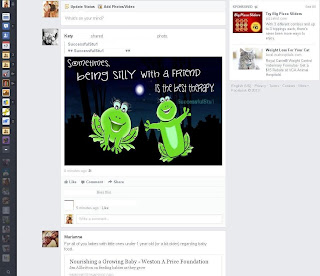I know I know. It’s a totally random occurrence. Somebody over there in California [or wherever the drawing was done] inputted some code on the keyboard and out together with probably a few thousand other names mine was included.
 |
| It doesn't mean I like it! |
Wait, just wait, hold on to that thought! I AM special. Every one of us is. My point is: if I am is not because of having been selected for the evaluation phase.
That clear enough? Good, let’s carry on then.
What do I think about the News Feed? Thought you’d never ask: I like it. As you may have probably gathered already by the title to this post, I believe it’s a hit. So, yes, there it is: Well done, Zuck! [More in a few about the title].
Unlike the dreaded and widely despised Timeline update, the latest facebook improvement is really something that most if not all of us facebookers will certainly enjoy. Not that this is supposed to be a long post but if you wanna save some time and go straight for the summarized version of what the News Feed is, go to this video.
The design for the updated News Feed is, let’s say, cleaner and fuller than the previously sort of cluttered look.
The screenshot above, with a post from one of my nieces and another from my youngest one, shows how big the photos look at present, in contrast with the look that most users still have on their wall. [Out of privacy concerns I have edited their full names and other details on their respective posts, but I am sure you’ll get the idea].
Hover the mouse on the left side of your screen and you’ll get a wider drop-down menu, easier to navigate than in the past. Click on News Feed on the right hand side [not shown on my screenshot] and you’ll also have the box expand with a full list where selections can be made of what you want to see: Close Friends, Photos, All Friends, Groups, Following, and so on.
Anything not to like? Well, yes, there are things that some of us will certainly not be pleased with. As it should be clear to everybody, your answer to that question will be strictly guided by your preferences.
For me, the let’s say worrisome part of the updated look is not necessarily the increased amount of promoted content that all of us users are already getting with the present format. What’s somehow euphemistically called Suggested Page or Suggested Post.
There is no free lunch and facebook is after all a business. All those shareholders do want something in return for their money.
There is however a kind of intrusiveness that I think most people will probably find grating. That’s a result of something called an algorithm, the magic word by which most everybody nowadays thinks one can be defined.
The fact that algorithms work doesn’t necessarily mean that they work all the time.
On occasions, they may lead to what’s called jumping to conclusions.
For a while I kept getting this invitation to visit a site where mature women can be contacted for dates. [Sorry, guys, not dating and if I were you can be sure they wouldn’t be women my age]. I let the Suggested Post ride for a few days, just to test whether it was just a coincidence — like, for example, a company having contracted with facebook to advertise their business much in the way you may contract for a newspaper ad or a TV commercial — or if I was indeed being targeted.
The targeting can happen for a number of reasons. Somewhere somehow you mention something about yourself, as well as your age and likes or dislikes, and there the algorithm gets into gear.
But it can also lead to what this commentator brands here as reaching for straws:
"For example, I only follow a dozen Pages on Facebook. These include Pages for friends' projects and friends' companies, the company I work for, an obscure band, an online game and a company that makes game development tools. Based on this paltry list, Facebook calculated it should present a post from social humor website Cheezburger. Why? Well, Facebook says, 'Cheezburger is similar to Pages you like.' That's just not true. If there were a 'dislike' button, I'd have used it."
"Facebook's algorithm is reaching for straws. I suspect this is because I don't bother following enough organizations or people for Facebook to make a relevant suggestion and because Facebook got paid to promote the Cheezburger post."
At times, of course, the algorithm can be fooled by your browsing habits. Even if nowadays I only work on a freelance basis, my being a journalist leads me on a constant search for information on subjects that I feel the need to be informed, whether I am writing about them or not.
Which is why, no doubt at all, I have gotten all these Suggested Pages from people or companies, as well as political parties, on both sides of the current debate about immigration in the United States.
You can also be sure, on the other hand, that when and if I decide to visit one of those webpages that facebook is telling me about, more ads will start appearing on my wall.
Reaching is also what facebook’s algorithm does in surmising that Likes from people on my Contacts list imply most surely that my preferences are the same.
“The company you keep” is the English equivalent of what algorithms basically do. As we say in Spanish: “Dime con quién andas y te diré quién eres.”
Well done, Zuck!, I headlined this post. Using the nickname by which some people refer to facebook’s CEO Mark Zuckerberg it’s neither dissing the man nor boasting of a familiarity that’s non-existent. It's just meant to get you interested in my post. Don’t you be jumping to any conclusion.

